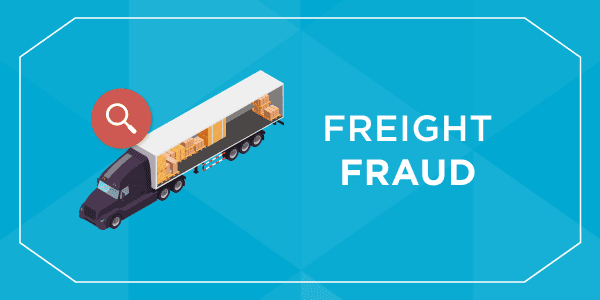
Everyone wants to get a better carrier rate, but there are instances where those low rates are too good to be true. While most in the logistics industry (in every link in the supply chain) are honest, hardworking people, that doesn’t mean fraud and theft don’t take place. The logistics industry is worth about nine trillion dollars worldwide, making it a prime target for theft and fraud.
Thankfully, companies can protect themselves through proven security protocols and best practices. The number one rule: never forgo security for the sake of a better rate. If you work with a third-party logistics provider, ensure that they are taking the proper measures to keep your freight safe and prevent fraud from happening. Most importantly, know the major types of fraud and theft, how they take place, and what you can do to prevent them.
The 3 Major Types of Freight Fraud and Theft
1. Double Brokering
Double brokering is the unauthorized transfer of goods from one freight broker or carrier to another. Essentially, the freight broker or carrier will charge you a rate, then transfer your shipment to another broker or carrier willing to haul it for less. This can result in stolen or damaged freight, delays, poor communication and tracking, and other issues.
While it’s not unheard of for a freight broker or carrier to be forced to shift loads to another party (in the event of breakdowns, scheduling conflicts, and other issues), you should always be notified of the transfer, be privy to all the details, receive documentation of the transfer, and receive a new agreement with the new freight broker or carrier.
Double brokering costs the freight transportation industry over $100 million annually.
2. Cargo Theft
Cargo theft is one of the oldest forms of loss for shippers and trucking companies, and it’s still a prominent problem in the industry. Cargo theft costs businesses between $15 billion and $30 billion a year, and the issue has extended beyond physically stealing items from the back of a truck. Thieves have taken to using modern technology to steal the identity of legitimate carriers, often fooling businesses and freight brokers into thinking they are legitimate trucking companies. These parties will operate on load boards and contact brokers and businesses, offering to carry loads at lower prices to entice them into thinking they are getting a great rate. Studies show that there has been a 600% increase in this type of cybercrime coming into 2023, and it’s something that all supply chain entities should be aware of and prepared to prevent.
In other cases, some of these entities will hold cargo and bills of lading (BOL) ransom at ports or other areas, essentially forcing businesses to pay for the release of their own freight (without getting back their original payment for the shipment).
3. Fraudulent Bills of Lading
Incorrect bill of ladings are also a known case of freight bill fraud. Bill of ladings with false information are a common way to launder money and commit other criminal acts. While this is most common with ocean freight, truckers and businesses should also take care to ensure that the freight inventoried in their BOLs matches the freight that is on the truck.
Preventing Fraud Begins with Carrier Selection
The carrier selection process is the first line of defense against freight fraud and theft. Nothing can replace longstanding relationships with your carrier base, or with a 3PL who has a trusted base of carriers. If you are seeking new freight brokers or carriers to haul loads for you, follow these tips to mitigate the risks of fraud and theft:
- Verify the carrier’s DOT number, MC number, insurance coverage, and license to transport the type of freight you are moving. Know that most fraudulent MC numbers are issued in California.
- Check for any freight guards that may have occurred in the last few months, especially if they indicate that double brokering has taken place.
- Ensure the carrier/s have been active for at least six months.
- Confirm that the phone number and email addresses provided by the carrier are valid and match what is on their registered authority. You can verify email addresses on Carrier411 or FMSCA.
- Check to ensure the carrier has been getting inspections.
If you are uncertain about a carrier, either error on the side of caution and deny their service, or work with the FMSCA to vet and verify them. If something looks suspicious, ask questions and don’t stop investigating until you get the answers you need.
Secure Your Data
Stopping fraud hinges on having secure, accurate, and valid data. Be sure to maintain the records of carriers you have used, which can include DOT and MC numbers, truck VIN numbers, carrier names, etc. If you use load boards, make sure that all logins are secured and backed from additional security (such as two-factor authentication). Protect your data to prevent it from getting into the wrong hands.
Track Freight
Always ask your 3PL for transparency when it comes to your freight and the carriers used. If possible, implement GPS tracking on the freight and refer to data from electronic logging devices (ELDs) to stay on top of carrier locations and activity.
Work with a Reliable 3PL
At King Solutions, we take the security of your freight and freight data seriously. We work with a trusted team of carriers with whom we’ve had long-standing relationships that are built on trust, integrity, honesty, and reliability. We take fraud seriously and take many steps to ensure that the risk to your business and its supply chain is limited.
Some of the fraud prevention steps we employ:
- Checking the MC number on the truck to verify it’s the same as the carrier we have booked.
- If the carrier’s MC number does not match, we thoroughly investigate why it’s different and will not load the truck until we resolve the issue. If we can’t determine why the MC is different, we will book a different carrier.
- Sticking to a strict carrier selection and fraud protection process to ensure freight is secure and bills of lading are accurate.
We provide world-class service that is built upon trusting relationships with our carriers and clients. It all begins with a single conversation. Ready to secure your supply chain? Get in touch with us today for a free consultation.







 Joel Rice
Joel Rice